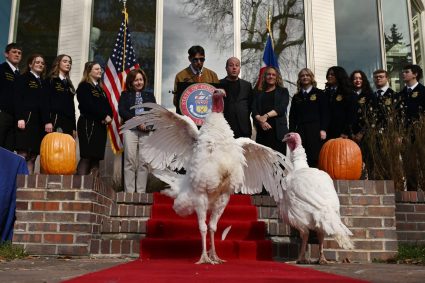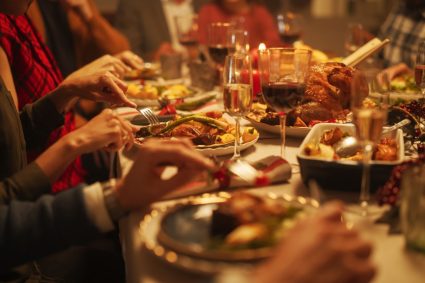Throughout America’s history, Thanksgiving has been celebrated in times of difficulty and dissension. People from diverse walks of life eat together with appreciation for the food and for each other. This Thursday should be no different.
Believe it or not, the first Thanksgiving meal held among native peoples and European migrants was in1565 not 1621. After grueling months at sea, some 800 Spaniards landed safely on the shores of what is now Florida. Thankful to be alive and on land, they celebrated a Mass of Thanksgiving and ate a meal with members of the Timucua people who lived nearby.
Their story has been eclipsed by the more popular telling of the Pilgrims’ Thanksgiving feast which they celebrated in autumn 1621 with the Wampanoag people whose crucial aid helped them survive their first year. As with the first Thanksgiving, people who differed in language, ethnicity, faith, culture, and politics shared a meal together in appreciation of God’s goodness.
One of the first official Thanksgiving proclamations was given during the Revolutionary War. General George Washington proclaimed December 18, 1777, the first national day of Thanksgiving. Later, once he took office, he issued the first presidential Thanksgiving proclamation. On that Thursday, November 26, 1789, Washington celebrated by attending church at St. Paul’s Chapel in New York City and donating food and beer to the city’s imprisoned debtors. Gratitude inspires a generosity of spirit.
After President James Madison proclaimed a day of Thanksgiving on April 13, 1815, the tradition languished until the dark days of the Civil War. President Abraham Lincoln issued a Thanksgiving Day proclamation for the last Thursday of November 1863, imploring the “interposition of the Almighty hand to heal the wounds of the nation, and to restore it, as soon as may be consistent with the Divine purposes, to the full enjoyment of peace, harmony, tranquility, and union.” This proclamation began the tradition of holding the day on the last Thursday of November.
That nearly changed during the Great Depression. When the last Thursday of the month landed on the last day of November, President Franklin D. Roosevelt feared the shortened Christmas season would negatively affect the struggling economy. FDR moved Thanksgiving to the middle of the month. States balked and for two years, Thanksgiving was celebrated on two different days. Congress passed legislation in 1941 to make Thanksgiving the fourth Thursday of November.
Just as the day of the holiday has changed, the foods served have as well. While the first Thanksgiving likely featured wild game and fish, Native American crops such as beans, squash, and corn and vegetables brought by the Pilgrims such as onions, cabbage, and turnips, modern Thanksgiving meals are a rich hybrid of foods from around the world.
Turkey, green beans, pumpkins, and corn were domesticated in Mesoamerica (today’s southern Mexico and Central America) while the wheat in the bread stuffing and peas were first developed in the Middle East and Near East, along with cows from which we get that ancient invention, butter. Potatoes hale from South America. The marshmallows you might add to another South American-bred crop sweet potatoes, however, were first made in ancient North Africa.
Brussel sprouts, as the name implies, were developed from cabbages in Belgium. Cranberries are native to North America but the sugar that sweetens the tart fruit dish originated in Papua New Guinea. If you have apple pie, thank the ancient farmers of Central Asia. If you’re going for pecans, thank Antoine, a Louisiana slave whose grafting technique in the 1840s took the native North American nut to the next level of deliciousness.
The food alone is worth celebrating! But Thanksgiving is so much more. Celebrated during times of war, economic depression, and strife as well as in years of plenty and unity, the holiday brings together people to eat and drink united in common humanity.
So put political pique aside this Thursday and be grateful to God, or wherever your faith tradition takes you, and for the people who sit beside you at the table.
Krista Kafer is a Sunday Denver Post columnist.
Sign up for Sound Off to get a weekly roundup of our columns, editorials and more.
To send a letter to the editor about this article, submit online or check out our guidelines for how to submit by email or mail.












